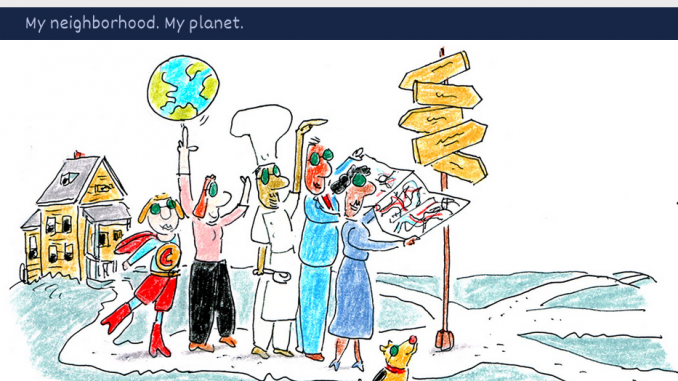
BY ALLISON LEVITSKY
Daily Post Staff Writer
A Palo Alto neighborhood umbrella organization has raised concerns about redundancy and a lack of transparency in a proposed $100,000 contract with a community-based environmental sustainability program.
The Cool Block program has already operated in Palo Alto, San Francisco and Los Angeles by forming block- or apartment building-based volunteer groups with the intention of getting residents to know their neighbors and working to improve environmental sustainability by committing to save water and electricity, to use transportation
other than cars and to plant community gardens.
The contract with the Empowerment Institute is on the City Council’s consent calendar — in which items are voted on with no discussion — on Monday (March 5).
However, Palo Alto Neighborhoods (PAN), an umbrella group for neighborhood associations in the city, voted Thursday (March 1) to request that council remove the contract from the consent calendar and schedule it for a regular public hearing.
Under the proposed contract, the institute would coordinate 30 “Cool Block Teams,” or neighborhood-based groups, who would meet nine times over four months. The team members would learn how to make their homes more energy efficient, prepare for a natural disaster, reduce their carbon footprint, save water and share more resources with their neighbors.
David Gershon, Cool Block’s managing director, is the co-founder and CEO of the Empowerment Institute, which he calls one of the “world’s foremost authorities on behavior change, community engagement and large system transformation.”

In 2012, City Manager Jim Keene and Gershon approached council with the idea for the Cool Block program, which was then called the Cool Cities Challenge. The city signed a letter of intent with Gershon to develop the program. The council agreed to participate in the program, with 15 residents volunteering as block leaders to start groups.
In 2016, Gershon secured seed funding to pilot the program, which it then renamed Cool Block. The Cool Cities Challenge is now a related program for which Keene is a key adviser.
Last spring, a second pilot took place, representing about 175 households across 24 blocks. Without listing a control group, Keene says that 41% of households on a Cool Block participated in the program, 55% of invitees ended up participating and households reduced carbon dioxide by an average 32%.
The average participating household took nine “disaster resiliency actions” and 26 total actions in the program, including disaster- and sustainability-related actions.
Last fall, Keene released a request for proposals to continue the Cool Block program.
“We required the (request-for-proposals) process as the vehicle for determining whether the city should contribute any funding to the new phase of that effort. I think that their model and their intention has merit. The council will decide on their contract,” Keene told the Post last night (March 2).
In a council report about the proposal, Keene says the Empowerment Institute — which originated the Cool Block program — was the “most responsive vendor” to the request to continue its own program. He didn’t say if any other vendors had submitted proposals.
In a letter sent yesterday, Palo Alto Neighborhoods co-chairs Sheri Furman and Rebecca Sanders questioned why the city should spend $100,000 on the program when the city already has an “extensive and well-organized” volunteer emergency preparedness team that is integrated with the city government.
The $100,000 contract would only include 30 blocks or apartment buildings. Because the Empowerment Institute would cover the another $100,000, the total cost of $200,000 boils down to about $6,667 per neighborhood group.
The proposal says the city wants to replicate this across 1,400 blocks or apartment buildings.
Other concerns include a lack of transparency: the proposed contract doesn’t include any measurable targets for participants other than vague terms like “empower” and “build trust.”
It also leaves open what actions participants would engage in, with no requirement that families attend a minimum number of meetings.
Keene is listed on the Cool Block website as a key adviser for the Cool Cities Challenge and Palo Alto partner for Cool Block. Cool Block’s website describes him as “one of the country’s most eloquent philosopher kings around the important role of cities.”
“The Cool Block is an idea and a volunteer effort. We have supported the earlier volunteer effort as we would with any other citizen volunteers seeking feedback on civic engagement,” Keene said. “I have consistently been a supporter for anyone and everyone who cares about more neighborliness and social connectedness by our citizens in our town.”




Glad to see people finally balking. How about less preaching and more fiscal fiscal responsibility? We’ve already got PA Utilities preaching to us to conserve energy and when we do, they raise our rates because we’re not using enough while they run a #20,000,000 surplus that gets funneled into the General Fund to buy us road furniture! We’ve already got the TMA preaching to us to get out of OUR cars but to fund the commuters’ commuting expenses while they over-run out neighborhoods. Enough already.
We’re already using NextDoor.com in Palo Alto. And it’s free. Most of our neighbors are on it.